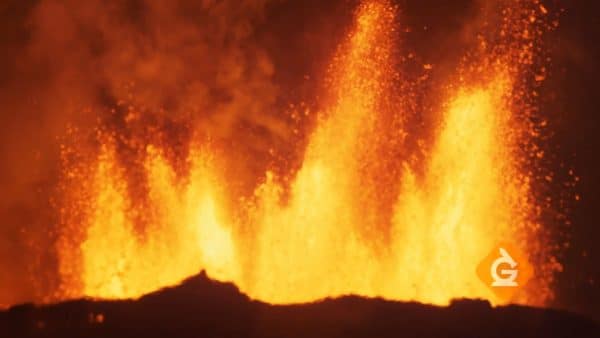Earthquake Definition
An earthquake is a sudden, violent shaking of the ground caused by movement of plates in the earth's crust. For example, earthquakes, volcanoes, and tsunamis are all natural disasters.
View Lesson on Natural Disasters
Become a member to get full access to our entire library of learning videos, reading material, quiz games, simple DIY activities & more.
Become a member to get full access to our entire library of learning videos, quiz games, & more.
Plans & Pricingto watch this full video.

Access All Videos
and Lessons, No Limits.
Access All Videos

No credit card required,
takes 7 sec to signup.
No card required

Ready-to-go lessons
that save you time.
Ready-to-go lessons
If you are on a school computer or network, ask your tech person to whitelist these URLs:
*.wistia.com, fast.wistia.com, fast.wistia.net, embedwistia-a.akamaihd.net
Sometimes a simple refresh solves this issue. If you need further help, contact us.
Natural Disasters
Fun Facts
- Earthquakes tend to form along plate boundaries, just like volcanoes, but they can also occur in other locations.
- Buildings closer to the ground experience less destruction during earthquakes.
- Tsunamis are huge waves often caused by underwater earthquakes.
Why Do We Need To Know About Earthquake
Studying earthquakes helps us see how important engineers are in keeping us safe. They use math and science to make buildings strong enough to stand up to earthquakes, protecting people and places.
Learning about this shows why building things to resist earthquakes matters and can lead to jobs in engineering, planning cities, and managing disasters. Knowing about earthquakes helps us come up with new ways to reduce their damage, showing why it’s useful to learn about them.
Frequently Asked Questions
Check out the Full Lesson on Natural Disasters
In this lesson, we learn that:
- Earthquakes, tsunamis and volcanoes are a result of natural processes.
- Earthquakes and volcanoes occur in patterns on Earth’s surface.
- They are mainly found along the boundaries between oceans and continents.
- Humans cannot eliminate these hazards, but we can take steps to reduce their impact.
Related Topics
- Adaptation Definition
- Air Mass Definition
- Bacteria Definition
- Biomimicry Definition
- Biosphere Definition
- Camouflage Definition
- Carbon Dioxide Definition
- Chemistry Definition
- Classify Definition
- Conductor Definition
- Convergent Boundary Definition
- Definition Of Engineering
- Definition Of Evidence
- Dichotomous Key Definition
- Digital Signal Definition
- Earthquake Definition
- Ecosphere Definition
- Electromagnetic Radiation Definition
- Element Definition
- Fertilizer Definition
- Fresh Water Definition
- Gravity Definition
- Keystone Species Definition
- Kuiper Belt Definition
- Light Source Definition
- Liquid Nitrogen Definition
- Magnetic Poles Definition
- Mass Definition
- Material Definition
- Moon Definition
- Multicellular Definition
- Natural Selection Definition
- Nucleus Definition
- Phases Of The Moon Definition
- Proton Definition
- Pull Definition
- Scientist Definition
- Seed Definition
- Senses Definition
- Smelling Definition
- Snow Definition
- Species Definition
- Symbiosis Definition
- Total Eclipse Definition
- Translucent Definition
- Vibrating Definition
- Wave Reflection Definition
- Wind Erosion Definition
Start a Free Trial Today. Get a $5 Amazon Gift Card!
Teachers! Start a free trial & we'll send your gift card within 1 day. Only cards left. Try it now.
Select Grade
Select Subject
This email is associated with a Science Kit subscription. Kit subscriptions are managed on this separate page: Manage Subscription

-
Download InvoiceScience & Math$/yr
-
Download InvoiceScience Only$/yr

access all lessons
• No credit card required •
"My students loved the videos. I started the video subscription in May and used them as a review before the state test, which I know contributed to 100% of my class passing the state test."
Rhonda Fox 4th Grade Teacher, Ocala, Florida
• No credit card required •
"My students loved the videos. I started the video subscription in May and used them as a review before the state test, which I know contributed to 100% of my class passing the state test."
Rhonda Fox 4th Grade Teacher, Ocala, Florida
• No credit card required •
Already a member? Sign In
* no credit card required *

* no credit card required *
* no credit card required *


no credit card required
Skip, I will use a 3 day free trial
Enjoy your free 30 days trial
-
Unlimited access to our full library
of videos & lessons for grades K-5. -
You won’t be billed unless you keep your
account open past your 14-day free trial. -
You can cancel anytime in 1 click on the
manage account page or by emailing us.
-
Unlimited access to our full library of videos & lessons for grades K-5.
-
You won't be billed unless you keep your account open past 14 days.
-
You can cancel anytime in 1-click on the manage account page.
Cancel anytime in 1-click on the manage account page before the trial ends and you won't be charged.
Otherwise you will pay just $10 CAD/month for the service as long as your account is open.
Cancel anytime on the manage account page in 1-click and you won't be charged.
Otherwise you will pay $10 CAD/month for the service as long as your account is open.
We just sent you a confirmation email. Enjoy!
DoneWe use cookies to make your experience with this site better. By using this site you agree to our use of cookies. Click "Decline" to delete and block any non-essential cookies for this site on this specific property, device, and browser. Please read our privacy policy for more information on the cookies we use.Learn More
We use cookies to improve your experience. By using this site, you agree to our use of cookies. Click "Decline" to block non-essential cookies. See our privacy policy for details.Learn More



























































































































